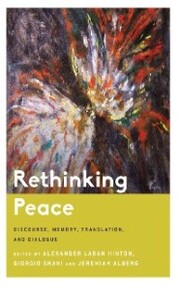Detailansicht
Rethinking Peace
eBook - Discourse, Memory, Translation, and Dialogue, Critical Perspectives on Religion in International Politics
ISBN/EAN: 9781786610393
Umbreit-Nr.: 2281356
Sprache:
Englisch
Umfang: 284 S.
Format in cm:
Einband:
Keine Angabe
Erschienen am 19.02.2019
Auflage: 1/2019
E-Book
Format: EPUB
DRM: Adobe DRM
- Zusatztext
- <span>Long considered a subfield of international relations and political science, Peace Studies has solidified its place as an interdisciplinary field in its own right with a canon, degree programs, journals, conferences, and courses taught on the subject. Internationally renowned centers offering programs on Peace and Conflict Studies can be found on every continent. Almost all of the scholars working in the field, however, are united by an aspiration: attaining Peace, whether positive or negative. The telos of peace, however, itself remains undefined and elusive, notwithstanding the violence committed in its name.<br><br>This edited volume critically interrogates the field of peace studies, considering its assumptions, teleologies, canons, influence, enmeshments with power structures, biases, and normative ends. We highlight four interrelated tendencies in peace studies:</span><span>hypostasis</span><span> (strong essentializing tendencies),</span><span>teleology</span><span> (its imagined end),</span><span>normativity</span><span> (the set of often utopian and Eurocentric discourses that guide it), and</span><span>enterprise</span><span> (the attempt to undertake large projects, often ones of social engineering to attain this end). The chapters in this volume reveal these tendencies while offering new paths to escape them.<br><br>Visit<a href="http://www.rethinkingpeacestudies.com/"><span>http://www.rethinkingpeacestudies.com/</span></a></span><span> for further details on the Rethinking Peace Studies project.</span>
- Kurztext
- <span>This edited volume critically interrogates the field of peace studies, considering its assumptions, teleologies, canons, influence, enmeshments with power structures, biases, and normative ends.</span>
- Autorenportrait
- <span>Alexander Hinton is Founder and Director of the Center for the Study of Genocide and Human Rights (CGHR), Distinguished Professor of Anthropology, and UNESCO Chair on Genocide Prevention at Rutgers University.</span><br><br><span>Professor Giorgio Shani is Chair of the Department of Politics and International Studies and Director of the Rotary Peace Center at International Christian University, Tokyo, Japan.</span><br><br><span>Professor Jeremiah Alberg teaches philosophy and religion in the Humanities Department of International Christian University. He is the Director of the Library and of the Center for Teaching and Learning.</span>
